Yes! Eating disorders are a real and serious health issue that stems from issues in the mental and physical health of the person. Most people have heard of anorexia nervosa or bulimia. However, these are only two of the many eating disorders. There are many more that you may never have heard of. In this article, I will discuss what eating disorders are, the behavioural, physical and emotional signs of eating disorders; who are at risk and everything else you need to know.
If you want to know more about other psychological and mental health issues, please subscribe to Guilt Free Mind. The subscription option is present in the sidebar. If you like watching videos, subscribe to the YouTube channel of Guilt Free Mind. Do not forget to ring the notification bell. You can also find me on Twitch. I do coworking streams every day.
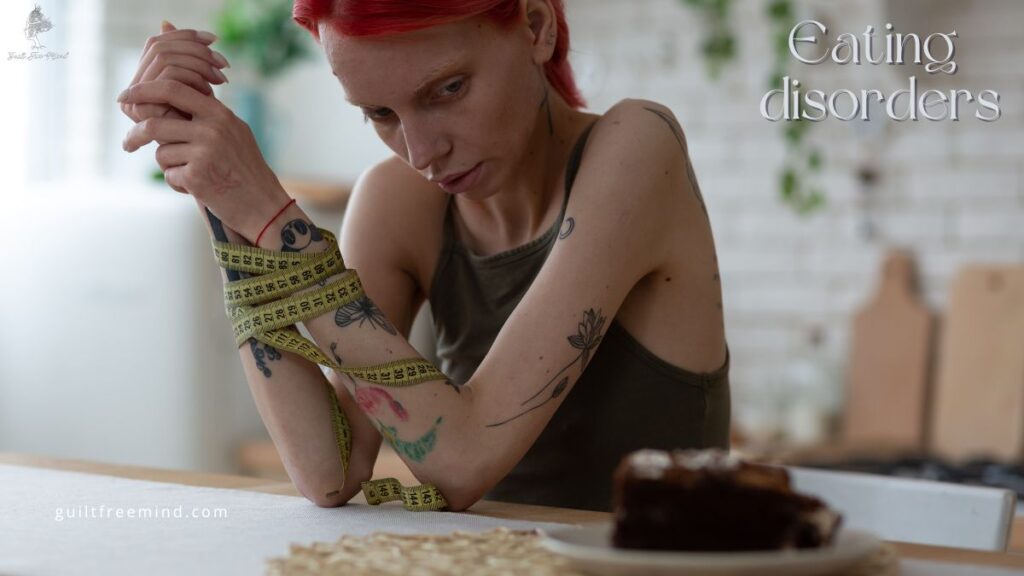
Table of Contents
What are the symptoms of eating disorders?
Eating disorders are serious health problems that can have a detrimental effect on both your mental and physical health. Those suffering from eating disorders have a very different view of food, weight, eating, body shape and eating patterns. The symptoms of eating disorders can have a major negative effect on your physical health, emotional health, and how you function in day-to-day life.
Long term presence of eating disorders makes it very difficult for your body to absorb nutrition. Thus, they can have a serious negative effect on your digestive system, bones, cardiovascular health, mouth, and teeth. They have also shown an association with self-harm, suicidal thoughts, depression, anxiety and other mental health issues.
If eating disorders are not treated effectively, they can turn into long-term problems. In some cases, this has also led to the death of the person. Among the top 3 eating disorders are bulimia, anorexia and binge-eating disorder.
Understanding eating disorders
As I mentioned before, there are different forms of eating disorders. Each of these has its signs and symptoms. Some of these like anorexia nervosa can be linked to the self-esteem and body image of the person. Such people are extremely bothered about avoiding weight gain and want to lose as much weight as possible.
Certain studies have shown that the desire to control food intake stems from the person’s inability to control other aspects of their life. The probability of occurrence of an eating disorder does not depend on the size, or weight of the person. It is also not about dangerous weight loss always. Thus, you must understand how eating disorders affect people.
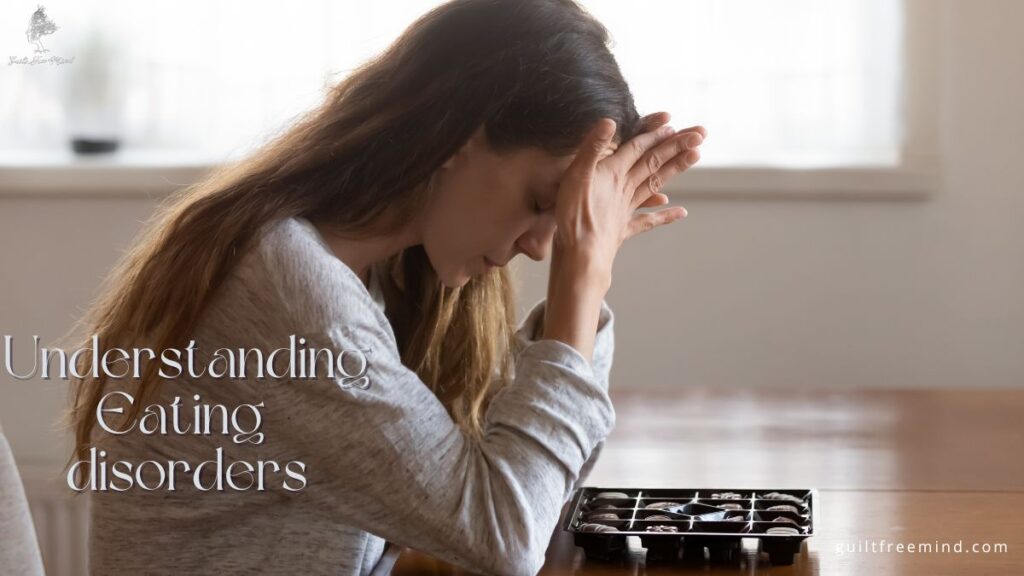
Definition of eating disorders
Eating disorders are behavioural issues characterised by the presence of persistent and severe disturbance in the eating behaviour of the person. Most often, these are also associated with distressing emotions and thoughts. These mental and physical health issues can impact a person’s social, physical and psychological functions.
As per the data available on eating disorders, this makes up a total of 5% of the population. In most cases, eating disorders are observed to affect those belonging to the young adulthood and adolescence ages. Furthermore, some eating disorders like bulimia and anorexia nervosa are observed to affect women more than men.
As I mentioned above, eating disorders impact millions of people in the same tree. Studies have shown that women in the age bracket of 12 to 35 are the most vulnerable. In many cases, eating disorders occur alongside other psychological or mental health issues like:
- Mood and anxiety disorders
- OCD
- Alcohol and substance abuse.
Certain shreds of evidence have implicated that genes and heritability may also have a role in deciding who gets affected by eating disorders. Thus, if a person has a family member or close relative suffering from an eating disorder, this increases their chances of getting affected.
The therapeutic options involve addressing the nutritional, behavioural and other medical issues the person might be facing. The medical complications generally include purging behaviour, malnutrition, gastrointestinal issues etc. If the eating disorder is not brought under control, it can lead to potentially fatal consequences.
Signs of eating disorders
People mostly think that if it’s an eating disorder, it will only show behavioural symptoms like eating less food, counting calories all the time, trying to avoid eating etc. However, along with behavioural signs, eating disorders also have emotional and physical signs. In this article, I will discuss all 3 symptoms of eating disorders in detail.
Behavioral signs of an eating disorder
The behavioral signs of eating disorders may vary depending on the specific eating disorder that the person is facing. However, some of the symptoms that indicate the presence of an eating disorder in the person are:-
- Severely reducing the food intake.
- Avoiding certain specific food items or completely avoiding food terns belonging to specific groups like carbohydrates.
- Dramatically changing diet plans so they can quickly shed a lot of weight; for example: following extreme dietary changes without proper consultation with a nutritionist or doctor.
- Adding in new food rituals like chewing excessively before swallowing the food.
- Constantly talking and discussing the nutritional level of each and every item they eat.
- Constantly feeling and saying that they look fat.
- Repeatedly cycling between eating too little and eating way too much.
- Regularly visiting the bathroom to relieve themselves and hoping that the food doesn’t add any weight
- Constantly focused on their weight and outward physical appearance. They are not happy with their looks and are constantly looking for flaws in themselves.
- Not eating around other people.

There are some other signs that you may notice around the house, in case one of your family members is showing signs of eating disorders.
- Suddenly large quantities start to go missing from the kitchen and pantry.
- Finding food in strange places around the home.
- Signs and symptoms of vomiting around eating time.
In case of certain eating disorders like pica, the individual may suffer from distinctive behavioural issues like craving and eating inedible items like chalk, paper, paint, soap etc.
Emotional signs of eating disorders
One thing to note here is that along with behavioral signs, eating disorders can also cause changes in one’s thought process. How the person feels about food, eating and their perception of their own body image also starts to show changes. A person with an eating disorder may slow the following emotional signs:-
- A constant preoccupation with their size, weight and body shape.
- A constant fear of weight gain
- Extremely high mood swings
- Very low self-esteem
- Extremely negative view of their own physical appearance. This negative view may distort from what the actual reality is.
- Constant feelings of guilt, shame and disgust related to eating.
- A feeling of overwhelming distress if they cannot control their own exercise or food routine.
- They may also withdraw from social situations.
- Withdraw from their family and friends.
- Stop being a part of any social activity.
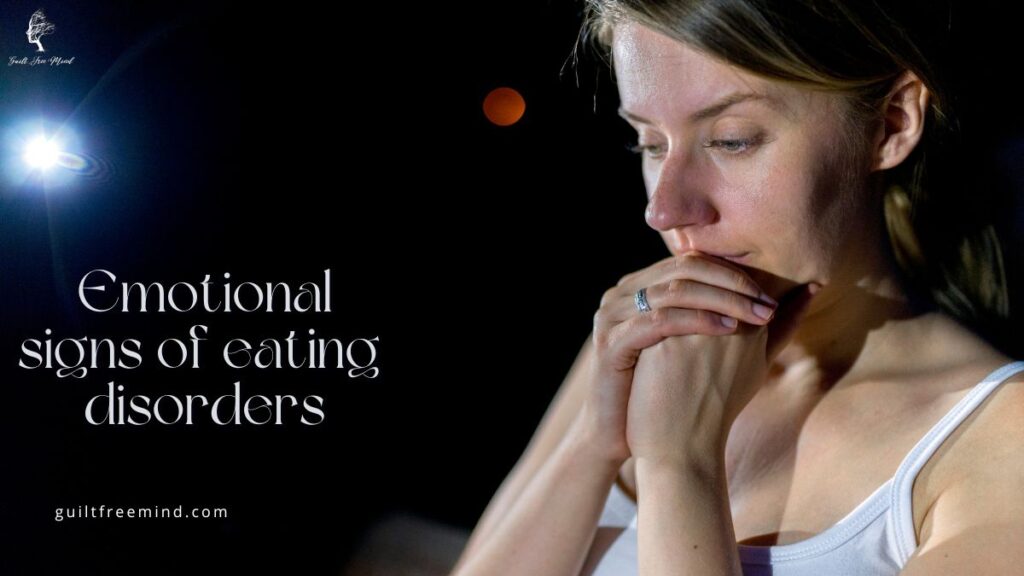
Physical signs of eating disorders.
The biggest physical sign of someone suffering from an eating disorder is a constant fluctuation in their weight levels. Unfortunately, weight gain or loss may also be indicative of other underlying health issues. Confirming that the weight loss is not due to any underlying medical condition is needed. Thus, this is not a reliable sign. Such people may try to hide their sudden weight loss by wearing layered or very thick clothing.
Other physical signs of eating disorders that you must watch out for are:-
- Constantly feeling cold.
- Brittle nails
- Dry hair and skin
- Tiredness, dizziness or weakness.
- Difficulty focusing on any task
- Constant acid reflux, stomach cramps and presence of other digestive issues.
- Insomnia or lack of sleep.
- Absence of regular periods. Constantly missing periods unless you are using hormonal birth control tablets.
- Wastage of muscles
- Growth of hair all over one’s body.
- Fainting.
Some laboratory tests can also be used to help diagnose the presence of eating disorders. These methods involve:
- Presence of low levels of thyroid and other hormones.
- Presence of a low potassium level
- Anaemia
- Presence of low white and red blood cell count.
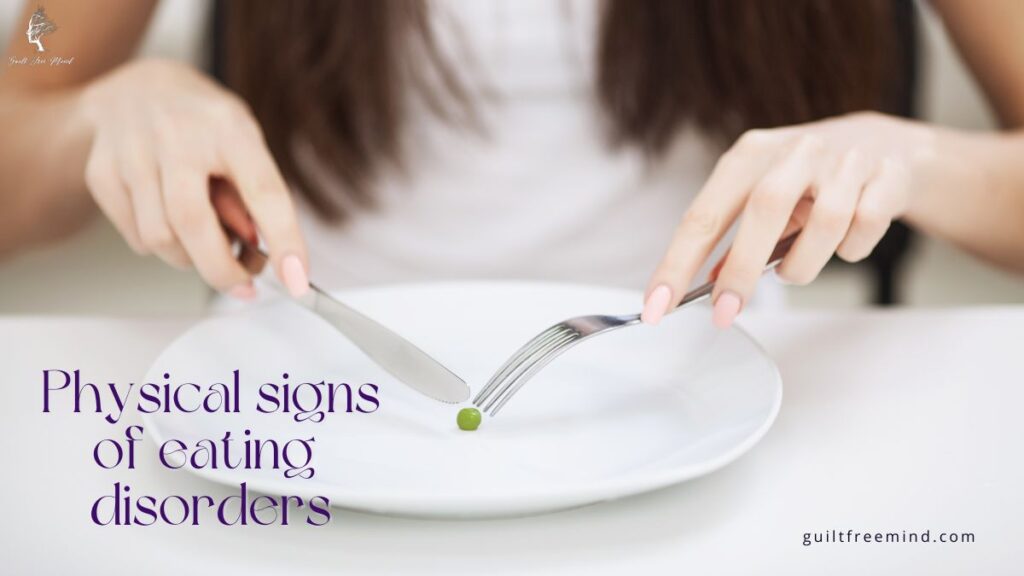
The following symptoms of eating disorders are only observed in the case of bulimia nervosa. These symptoms are primarily the result of repeated vomiting. These signs and symptoms involve:
- Cuts or callouses on the finger edges
- Discoloured and sensitive teeth
- Presence of cavities
- Erosion of the tooth enamel.
Who is at a high risk of developing eating disorders?
The problem with eating disorders is that they can manifest at any time of life. They can affect any person belonging to any age, gender or ethnicity. There is a common myth that mostly girls face eating disorders. Males are not affected. However, this is a lie. Males and females have an equal chance of getting affected by eating disorders. However, there are certain factors that boost the chance of a person suffering from an eating disorder. These are mostly: –
- Presence of a family history of addiction, eating disorders or other forms of mental health issues like anxiety or depression.
- Presence of a history of trauma. It can either be sexual, emotional or physical.
- Presence of a history of depression, anxiety or obsessive-compulsive disorder
- A dieting history.
Other factors include
- Presence of diseases like diabetes ( studies have shown that over one-fourth of women suffering from type I diabetes tend to develop an eating disorder eventually.
- Getting involved in tasks that put a lot of focus on physical appearances, especially those requiring a slender appearance of the individual like gymnastics, wrestling, swimming, running etc.
- Tendency to be a perfectionist all the time.
- Undergoing major life changes like starting a new job or school, moving to another place, divorce etc.
Complications of eating disorders
Eating disorders are considered to rank second on the list of lethal psychiatric disorders. The first one to rank is opioid use disorder. Trying to maintain a specific body size or weight by harmful methods can take a heavy toll on your body. If the eating disorder is left untreated, it can cause serious complications like
- Low blood pressure (hypotension)
- Acid reflux (GERD or gastrointestinal reflux disease)
- Heart failure, arrhythmia, other heart issues
- Brain damage and organ failure
- Tooth damage
- Osteoporosis
- Constipation and severe dehydration
- Infertility and reduced frequency of menstrual cycle (amenorrhea)
- Stroke
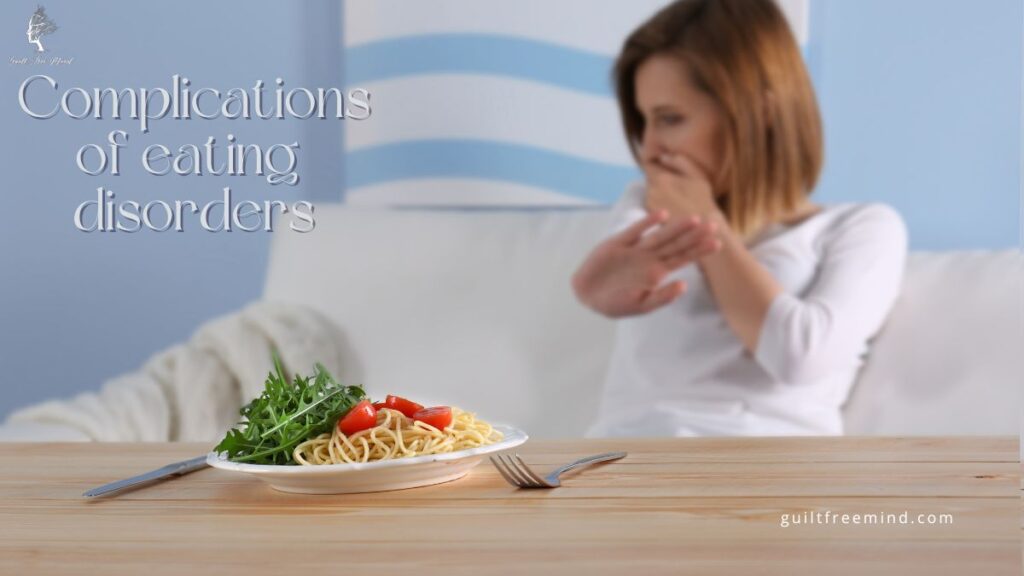
When do you need support?
With the availability of proper treatment and support, you can recover from any type of eating disorder. In the case you feel that you are suffering from one of the eating disorders, you must seek the help of a mental health professional as soon as possible.
The method of recovery in the case of eating disorders requires a person to work with a team so that every possible cause at the root of the eating disorder can be identified. They will also help you understand and manage all of the physical, emotional and behavioural symptoms. This team of people may include:
- A therapist who has a speciality in treating eating disorders
- A registered dietician helps the patient manage the symptoms and explain to the patient the need for nutrition by the body and how to achieve a balanced diet.
- A general physician helps manage the nutritional levels in the body and address other physical symptoms.
- A dentist to address the effects of bulimia nervosa on the teeth of the patient.
- Finally, last but not least, a psychiatrist in case medications is needed to reduce the psychological symptoms of the disease.
Diagnosis of an eating disorder
The diagnosis of eating disorders is generally done by mental health professionals or general physicians. Your healthcare provider may recommend a few blood tests on the basis of the symptoms that you show. This will be done to rule out any underlying medical condition that may be responsible for the eating disorder.
You may also be recommended to visit a mental health counsellor like a psychiatrist or psychologist to identify if the root of the problem is a mental health issue. The mental health counsellor will conduct psychological tests to identify which mental health issue is causing the eating disorder.

For diagnosis, mental health practitioners refer to the Diagnostic and Statistical Manual of Mental Disorders (DSM-5). The DSM has the outline of each of these disorders. It is not necessary for all the symptoms exhibited by the patient to match with the symptoms of the disorders presented in the DSM-5 manual.
Recovery process
When you start recovery, having complete support and compassion from your colleagues, family and friends is crucial. Some of the recovery programs allow the loved ones of the patient to attend at specific times. Family numbers are also educated about how they can best provide support to the patient.
In case the patient shows signs of being extremely underweight, malnourishment or dehydration, they should be hospitalised. This way, they can get complete and proper medical help.
Opting for support groups
You can either opt for an in-person or online support group for eating disorders. If possible, opt for groups that specifically focus on eating disorders like
- National Easing Disorders Association (NEDA)
- National Alliance for Eating Disorders (NAED)
- F.E.A.S.T, is responsible for providing support and educational materials to the loved ones of the patient so that the patient can have all the support they need.
Other organisations like National Alliance on Mental illness (NAMI connection groups).
Residential, inpatient and outpatient treatment programs are also available to help those suffering from eating disorders. In most cases, the organisation offering the services will offer all three together.
Conclusion
Now that you know all the signs of eating disorders, what are your thoughts? Is there a chance that you or your loved one may be suffering from an eating disorder? If you feel that there is a chance, go/take them to a general physician as soon as possible so that the probability of it being a medical issue can be diagnosed/ruled out. In case it is not a medical issue, consult a psychiatrist or a psychologist immediately. Eating disorders can be extremely detrimental. thus, you must never never be ignored.
Do you want to know about the types of eating disorders? If yes, then subscribe to Guilt Free Mind. The next blog post will be released next week. The subscription option is present in the sidebar. Your subscriptions will allow me to notify you the moment the next blog post releases This way, you will not miss out on any important information pertaining to mental health. If you like watching videos, subscribe to the YouTube channel of Guilt Free Mind. Remember to ring the notification bell.
Finally, last but not least, if you have any queries about this blog post or any other on Guilt Free Mind, feel free to drop them in her comment section. If you wish to interact like with me, you will find me live on Twitch. I do coworking streams almost daily, I will be happy to help in any way I can.
See you in my next blog post
